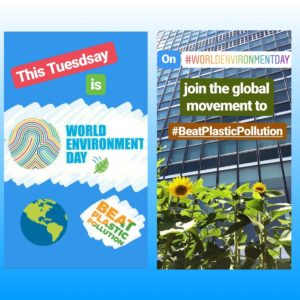 By 2050, there will be more plastic than fish in the world’s oceans unless we begin cutting back on production and improper disposal methods, according to a World Economic Forum report.
By 2050, there will be more plastic than fish in the world’s oceans unless we begin cutting back on production and improper disposal methods, according to a World Economic Forum report.
Worldwide, over the course of the past 50 years, plastic use has increased 20%. Without dramatic shifts in production and consumption, by 2040 that number will double: the world is currently on track to produce three times as much plastic in 2050 as in 2014.
[list type=”caret”]
- 1 million plastic drinking bottles are purchased every minute
- 5 trillion disposable plastic bags are used every year
- 8 million tons of plastic – bottles, packaging and other waste – are dumped into the ocean every year, killing marine life and entering the human food chain
[/list]
[title type=”h4″]Refuse what you can’t Reuse[/title]
You may not know what single-use plastic is, but you likely used it recently when you drank bottled water or soda, used a straw, carried vegetables from the market in a bag, or stirred your coffee.
In fact, single-use plastic is used so widely that a massive island of plastic 3 times the size of France is currently floating between California and Hawaii, and a plastic bag was recently found at a depth of 36,000 feet inside the Mariana Trench. UNDP Administrator Achim Steiner
The focus for World Environment Day 2018 is on beating plastic pollution. Throughout the Day UN Environment provided live updates on events and commitments, reporting such highlights as India’s commitment to eliminate all single-use plastics by 2022 and a plan by Ghana manufacturers to initiate a take-back system.
 “With our pledge today, India is sending a message to the world that we can beat plastic pollution,” said Minister Mahesh Sharma. “We are committed to making the peripheries of 100 historic monuments in India litter free.”
“With our pledge today, India is sending a message to the world that we can beat plastic pollution,” said Minister Mahesh Sharma. “We are committed to making the peripheries of 100 historic monuments in India litter free.”
Mogens Lykketoft, President of the UN General Assembly for the 70th session, said the time for implementation is NOW.
“We must now begin to practice what we have preached – changing our production and consumption patterns in order to create virtuous cycles rather than depletive ones and harnessing the global interconnectedness, communications technology and breakthroughs in materials science,” he noted.
10 Easy Ways to Cut Plastic Out Of Your Life
1. Carry a reusable bottle
2. Don’t use plastic straws
3. Avoid disposable cutlery
4. Use a reusable coffee cup
5. Avoid excessive food packaging
6. Use canvas bags for vegetables
7. Purchase reusable household items
8. Buy bars of soap and shampoo
9. Use matches instead of disposable lighters
10. Recycle more efficiently.
